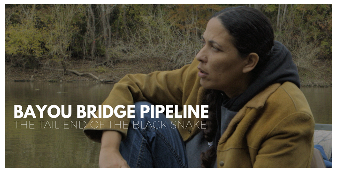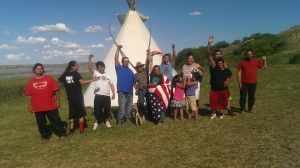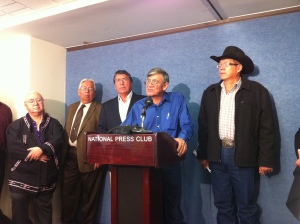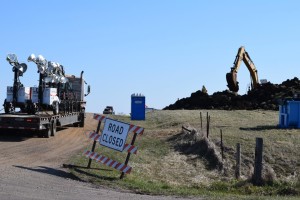Indigenous Environmental Network Releases powerful video showing the impact of Bayou Bridge and the plight of coastal Indigenous people in the Louisiana wetlands
Springfield, LA – Following legal victories for the Tribes at Standing Rock, Water Protectors in Southern Louisiana will open the L’eau Est La Vie (Water is Life) Camp tomorrow. The launch marks the next fight to protect Indigenous rights, life-giving water and to stop Energy Transfer Partners from committing acts of environmental injustice.
The Indigenous Environmental Network announced the opening of the camp with a video, highlighting, Cherri Foytlin who represents IEN’s interests in the Bayou. The video explains the connection between the Bayou Bridge and Dakota Access Pipeline, the Houma tribe, and all people who will be impacted by these pipelines, and why completion of the Bayou Bridge pipeline must be stopped.
Watch the video below, and learn more about the L’eau Est La Vie (Water is Life) Camp and the lead organizers rising up on the frontlines of the fighting for environmental justice to protect Indigenous rights, clean water, and rapidly disappearing wetlands on the Gulf Coast.
The following is a statement from the Indigenous Environmental Network:
“L’eau est La Vie camp is opening in resistance to the Bayou Bridge Pipeline (BBP) another Energy Transfer Partners project. BBP is the tail end of the Dakota Access Pipeline that weaves from the Bakken to the fragile wetlands of Southern Louisiana. Once again Indigenous communities are being put in harm’s way and over 700 bodies of water will be threatened by one of the worst environmental offenders known to date. We stand with the Water Protectors here in southern Louisiana to protect these critical wetlands that serve as protection for the people of this region from floods and storms.”
The following is a statement from Monique Verdin, councilwoman of the Houma Nation:
“I’m not sure if we are at the head or the tail of the black snake; But we already got enough pipelines, 83,000 miles running through Louisiana. Miles of old infrastructure, built across the Mississippi River Delta’s coast decades ago, surrounded by a disappearing landscape in some of the most vulnerable territories in the world, enduring rising tides and more frequent, powerful and unpredictable weather conditions. Louisiana has sacrifice enough, we don’t need another risk of oil in our waters. It’s one thing if you can’t fish. It’s another thing if you can’t drink water. Over 300,000 people depend on the Bayou Lafourche, for their drinking water in the heart of Houma territory. We don’t need another pipeline. We need clean water.”
The following is a statement from Cherri Foytlin, of BOLD Lousiana:
“The corporation Energy Transfer Partners (ETP) has proven themselves to be untrustworthy in regards to their moral responsibility to preserve both human and ecological rights. Whereby they have obfuscated the truth, sabotaged democracy, destroyed our lands and water, and even hired mercenaries to injure our people, we have but one recourse, and that is to say ‘you shall not pass.’ No Bayou Bridge! We will stop ETP. They are not welcome here – not in our bayous, not in our wetlands, not in our Basin, not under our lands or through our waters. Period.”
Media interested in interviews with IEN organizers on the ground at L’eau Est La Vie (Water is Life) Camp should contact Nina Smith at 301-717-9006 or nina@megaphonestrategies.com, or Jade Begay at 505-699-4791 or jade@ienearth.org.




